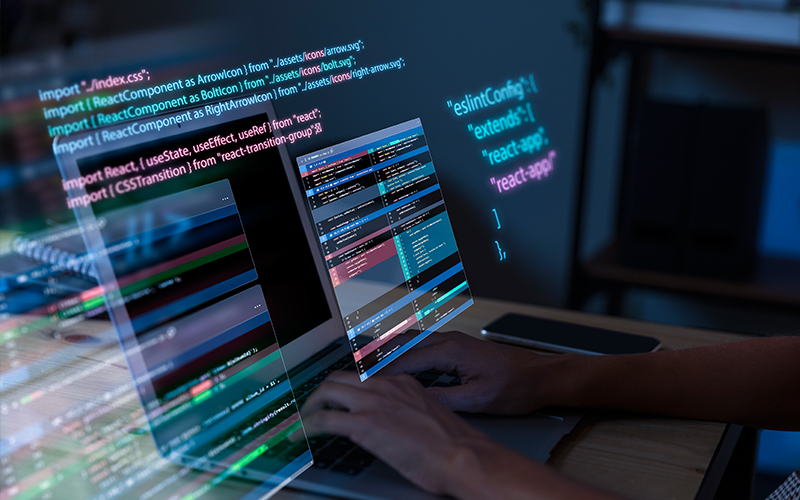Technology evolves at a dizzying pace, and keeping up with new trends is key for developers to not only advance their careers but also stay competitive. The year 2025 is expected to bring breakthrough advancements in many areas of technology. To be ready for what lies ahead, developers need to focus on the following essential knowledge and skills.
1. AI and Machine Learning
Artificial Intelligence (AI) and Machine Learning (ML) have become indispensable in tech products and services. By 2025, integrating AI into applications will be even more common, and developers will need to understand how to build and deploy AI/ML models.
How to learn AI/ML?
- Master the basics of supervised learning, unsupervised learning, and reinforcement learning.
- Learn how to use popular libraries and frameworks like TensorFlow, PyTorch, and Scikit-learn.
- Explore cloud AI services like Google AI, AWS SageMaker, and Azure AI.
2. Web 3.0 and Blockchain Development

Web 3.0 is seen as the next generation of the internet, where blockchain, smart contracts, and decentralization play central roles. Developers will need to understand how these technologies work to build decentralized applications (dApps) and harness the potential of blockchain.
What to learn about Web 3.0 and blockchain?
- Learn how blockchain works and explore popular platforms like Ethereum and Solana.
- Gain knowledge about smart contract development using Solidity.
- Explore development opportunities with NFTs, DeFi (Decentralized Finance), and other decentralized solutions.
3. Software Development with Low-Code/No-Code Platforms
Low-Code/No-Code platforms are changing how developers build applications by reducing the need for manual coding. This trend will grow stronger in 2025 as it shortens development time and reduces costs.
How to get into Low-Code/No-Code?
- Familiarize yourself with development platforms like Microsoft PowerApps, OutSystems, and Bubble.
- Learn how to design and manage applications using these tools without complex coding.
- Understand how to integrate Low-Code/No-Code applications with existing APIs and services.
4. DevOps Skills and Cloud Management

DevOps and cloud technologies have become the standard in modern software development processes. By 2025, knowledge of CI/CD (Continuous Integration/Continuous Deployment), automated infrastructure management, and cloud deployment will be essential for developers.
How to enhance your DevOps and Cloud knowledge?
- Learn to use popular DevOps tools like Jenkins, GitLab CI/CD, and Docker.
- Get acquainted with leading cloud services like AWS, Google Cloud, Azure, and infrastructure management tools like Terraform and Kubernetes.
- Explore strategies for managing and optimizing cloud costs.
5. Programming with Rust and Go
Rust and Go are emerging as powerful programming languages for distributed systems, blockchain, and high-performance applications. With memory safety features and excellent performance, Rust and Go will continue to gain attention in large-scale projects.
How to start learning Rust and Go?
- Learn the syntax and basic concepts of Rust and Go.
- Contribute to open-source projects using Rust or Go to sharpen your skills.
- Explore how to optimize performance in distributed applications or blockchain projects.
6. Cross-Platform App Development with Flutter
Flutter, Google’s mobile app development framework, is becoming increasingly popular due to its ability to create cross-platform applications with a consistent UI. By 2025, Flutter will continue to thrive, making it a valuable skill for developers.
How to get started with Flutter?
- Begin by learning the basics of Dart, the primary language of Flutter.
- Learn how to build cross-platform mobile applications with Flutter and leverage its rich UI library.
- Explore how to optimize Flutter apps for high performance on both Android and iOS.
7. Augmented and Virtual Reality (AR/VR)

AR and VR technologies are gradually becoming part of everyday life, from entertainment and education to e-commerce. By 2025, developing AR/VR applications will open up numerous opportunities for developers in various industries.
How to start with AR/VR?
- Get familiar with AR/VR development tools like Unity and Unreal Engine.
- Learn to develop augmented reality applications using ARKit (for iOS) and ARCore (for Android).
- Explore opportunities to enhance user experiences in virtual reality applications.
8. Edge Computing
As the demand for faster and more efficient data processing grows, edge computing is emerging as a key trend. Instead of relying solely on centralized cloud services, edge computing processes data closer to the source—reducing latency and enhancing performance. In 2025, edge computing will play a crucial role in IoT (Internet of Things), autonomous vehicles, and smart city applications.
How to get into edge computing?
- Learn about distributed systems and real-time data processing.
- Get familiar with frameworks and platforms like AWS IoT Greengrass, Azure IoT Edge, or Google Cloud IoT Core.
- Understand the challenges of optimizing edge devices in terms of power consumption, data processing, and security.
9. Quantum Computing
Quantum computing, though still in its early stages, is progressing rapidly and is expected to start influencing software development by 2025. While the technology is complex, understanding its foundations can give developers a head start in areas like cryptography, optimization problems, and simulations.
How to approach quantum computing?
- Learn the basic principles of quantum mechanics and how quantum bits (qubits) differ from classical bits.
- Explore platforms like IBM Quantum Experience or Google’s Quantum AI to experiment with quantum algorithms.
- Follow developments in quantum-resistant cryptography to stay updated on how this technology might disrupt existing encryption methods.
Conclusion
To stay ahead in 2025, developers must continuously update their knowledge and develop deep technical skills. From AI to blockchain, DevOps, AR/VR, and emerging programming languages like Rust and Go, the coming years will offer many opportunities for those who are well-prepared. Start learning today to ensure you remain at the forefront of technology’s evolution.




